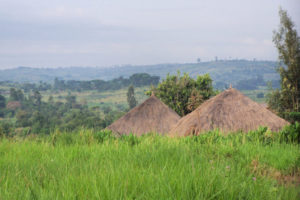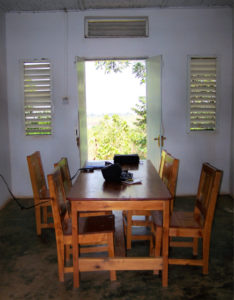When I was twenty years old, I took a semester off from college and did what I’d wanted to do for five years: I moved to Uganda. I took a position teaching English there because that was the sort of thing people gave you money for, but my real reason for going was that at fifteen I met a bishop from Uganda at my South Texas summer camp. He stepped briefly into what I hadn’t realized was an empty space in my life and offered me both notice and kindness. Our interaction gave me a glimpse of a world I’d never pondered with seriousness and a taste of its richness, and I came away certain that his people were people I must know.
When I finally arrived in Nebbi five years later, however, I realized that flying halfway around the world to meet new people wasn’t simple. I would wake at strange hours and jet-laggedly disentangle myself from my mosquito netting, looking out a barred window at the steep green hills dotted with banana trees and roof thatch, the wandering goats, the people all speaking a language I didn’t understand. I felt not only foreign but entirely alien. It was early January and the cluster of buildings up the road where I was supposed to teach wouldn’t open until sometime in February. Without even that concrete purpose to anchor me, I wandered miserably from room to room as the sole occupant in the cool dark of Yesu Kende Guest House, sometimes reading, sometimes weeping. I knew no one and hated the acute notice my white skin generated whenever I left the house, so I didn’t often venture farther than the porch.
I felt not only foreign but entirely alien.
The bishop I had met at fifteen was now the archbishop of all of Uganda, and his former position as Bishop of Nebbi had been filled by my neighbor, Alphonse Watho-Kudi. Bishop Alphonse was a short, bald man with a manner that was at once commanding and humorous. I met him several times and went to church with him once in a nearby town, and he noticed my unhappiness. One evening he came to visit, and as we sat enveloped by the hum of night from the open double doors of the guest house, his hand came down in a decisive smack on the table. “You are my daughter,” he said. “Get your things.”
I followed him in embarrassed relief up the hill to the long, rectangular house with a central courtyard that was the official bishop’s residence, clutching a pillow and pulling a suitcase. When we walked through the door Bishop Alphonse’s wife, Evalyn, told me she had put fresh sheets on the two twin beds in the guest room before her husband had even discussed the subject with her, because she had heard me crying.
“You are my daughter,” he said. “Get your things.”
They fed me, taught me to cook, and included me in family prayers with their five children. When the bishop took me along on errands he would say, “This is my daughter Catherine. She is just six days old.” Or two weeks old. However long it had been since I entered their house. The pride evident in these introductions remains with me to this day—my biological father, himself a priest, left when I was a baby. My existence raised all sorts of inconvenient questions for him, and whenever I visited him as a child and met his parishioners there was something hanging between us all, something like the less said about this the better for everyone. I was more familiar with being the source of something a father wished he could hide.
I’d been chasing a connection with Nebbi for five years, ever since that one interaction at summer camp had made it an imperative, but what the Watho-Kudi family now offered me was beyond friendship. They were offering belonging, a rootedness in this new place I hadn’t imagined possible. When the bishop took me on a day trip to the village where he and his family had lived before he was consecrated, he told me that I needed to see where I came from. I stood before the family grave plot, as white as ever, with a vertigo I still feel when I ponder how and whether I can belong to this family. I want it, but it’s too much. My English ancestors colonized the very people lying in those graves. There is a legacy standing between me and the Watho-Kudis, and it feels to me as though calling them mine means pretending that legacy doesn’t exist or doesn’t matter.
They were offering to graft me into their very heritage, and I feared (and still fear) claiming too much.
And yet their love for me. The casual certainty of their language: “This is my daughter Catherine. She is just six days old.” The bishop’s hand striking the table.
They were offering belonging, a rootedness in this new place I hadn’t imagined possible.
I can still recite (though nobody ever asks me to) the definition of a sacrament, drilled into me at twelve: the outward and visible sign of an inward and spiritual grace. I have a trickle of water, a scent of oil to grasp whenever the shifting landscapes within me feel truer than the truth I can’t see. That moment when the bishop’s hand came down on the table in the guest house, the sound his ring made, only makes sense to me as a sacramental moment. As though a new reality had been conferred, a truth made visible for an instant that I would struggle for the rest of my life to accept.
I didn’t deserve to be grafted into a Ugandan family; my preoccupation with this fact is, at its heart, an inability to receive a kind of grace. I don’t want to overstep, to claim what I don’t deserve and can’t earn, and this seems to me like virtue. But declining this kind of grace when it’s offered only really accomplishes one thing—it keeps us apart. And if I still want what I began wanting when I was fifteen years old, I must find my way towards accepting the extravagance of what the Watho-Kudis gave me.
Like this post? Subscribe to have new posts sent to you by email the same day they are posted.





This made me think about receiving God’s grace in a new way – it’s something I am afraid to take, and yet something I deeply need. I felt the writer’s anxiety and desire clearly.
Beautifully expressed example of lavish grace and the author’s understanding of the importance of accepting that gift.
Perception is a rare gift, one we seldom consider when we talk about personal gifts. The Bishop’s perception and the perceptions of his wife are gifts we should think about, maybe even cultivate.